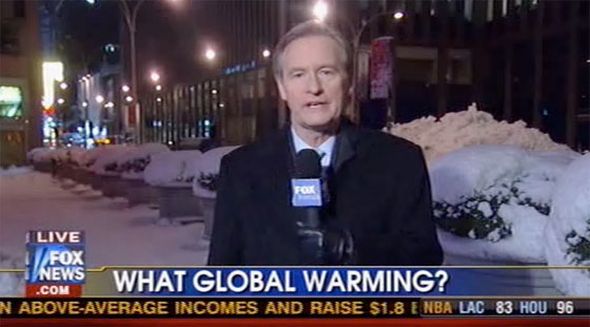Peer-Reviewed Article · Sep 29, 2014
Media “Echo Chambers” and Climate Change
Filed under: Policy & Politics

We are pleased to announce the recent publication of a new peer-reviewed article: Feldman, L., Myers, T., Hmielowski, J., & Leiserowitz, A. (2014). The mutual reinforcement of media selectivity and effects: Testing the reinforcing spirals framework in the context of global warming.
Given the diverse sources of news now available in the U.S., partisans can easily choose news sources that align with their political attitudes. Does the rise of partisan news—on cable, talk radio, and the Internet—allow Americans to insulate themselves in “echo chambers” where they are exposed only to content consistent with their opinions, while shielded from dissenting views? If so, this may reinforce partisans’ existing attitudes, making it increasingly difficult for policymakers and the public to achieve mutual understanding and compromise on the most pressing issues of the day, including climate change.
Do the media influence audience beliefs, or are audiences simply drawn to outlets that
support their pre-existing views? Recently, communication scholars (e.g., Slater 2007) have proposed the “reinforcing spirals framework” to describe a dynamic, mutually reinforcing spiral of influence between media sources and their audiences. Our study applies this framework to examine Americans’ responses to global warming. Specifically, we test the relationships between media use (conservative and non-conservative), global warming beliefs, and support for climate change policy over time.
We find that partisan media sources do influence individuals’ beliefs about global warming. Specifically, use of conservative media sources such as Fox News and Rush Limbaugh is associated with the belief that global warming is not happening and greater opposition to climate policies, whereas use of non-conservative media such as network TV news, CNN, MSNBC, and NPR is associated with the belief that climate change is happening and greater policy support. In turn, audiences’ beliefs about global warming drive them to select media outlets that support their perspectives, which further strengthens these views over time in an ongoing, reinforcing cycle. We also find relatively stronger reinforcing effects for conservative media than for non-conservative media.
The findings demonstrate an “echo-chamber” effect by which partisan media outlets, especially conservative sources, maintain their audiences. They provide consistent political messaging, which influences political beliefs, and these beliefs in turn drive people back to supportive news sources and away from opinion challenging media, in a repeating cycle. This may be further exacerbated by conservative media’s attempts to insulate their audiences from opposing views—in part, by denouncing the mainstream media (i.e., other news sources) as liberal, biased, and not to be trusted.
Overall, the findings may help to explain why the overwhelming scientific evidence that global warming is happening and caused by human activities has failed to gain traction among conservatives, or at least among users of conservative media in the United States. In essence, conservative media audiences are consuming messages that both challenge the reality of global warming and warn that any contrary information from scientists or the mainstream media should be dismissed. This perpetuates further use of conservative media, which reinforces their current beliefs about global warming, and so on in a continuing feedback loop.
Our findings raise challenges for climate communicators working to develop a public consensus on climate change. Indeed, it seems that many Americans are becoming isolated on ideological islands in which certain facts are accepted while others are automatically questioned and discarded, thereby impeding much-needed progress toward policy solutions. One way forward is the development of communication campaigns focused on specific media outlets and audiences that align climate change and energy insecurity solutions with conservative ideals of limited government.
If you would like a copy of the paper, please email us at climatechange@yale.edu with the subject line: Echo Paper request.